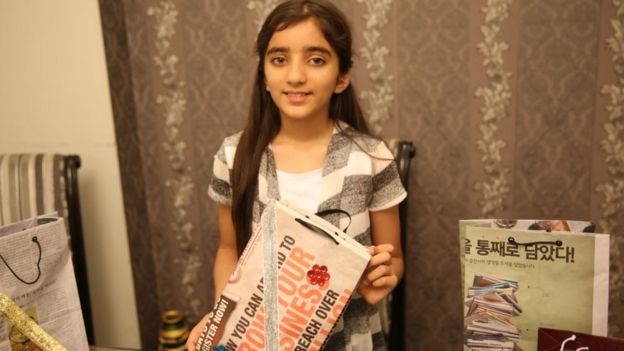 |
| Zymal turns old newspapers into gift bags
"If people just thought for a moment before dumping their rubbish then maybe they wouldn't do it as it harms our environment."
Zymal Umer, 10, sighs as she takes in the view of a makeshift rubbish dump on the outskirts of her hometown Sargodha in Punjab, Pakistan. But could the girl dubbed the country's "youngest social entrepreneur" by many have a solution?
For now, there are colourful piles of plastic bags, metal and general waste as far as the eye can see.
Wafts of smoke fill the air with a putrid and toxic stench as much of the refuse is set on fire.
What's in front of Zymal is just the tip of the iceberg that is Pakistan's problem with waste.
According to the country's environment protection department, 20m tonnes of solid waste is generated a year and the figure is growing by 2.4% annually.
Landfill issues
"This is a situation you can find across all of Pakistan - these bags are not biodegradable and people carelessly discard them. They don't really think about recycling," Zymal says.
Proper solid waste management has never been practiced in the country; only half of the rubbish generated is collected by the government and there is a severe lack of adequate landfill sites.
Dumping and burning remain the most common methods of disposal and much of the uncollected waste poses serious risks to public health.
Beautiful bags
Zeebags is Zymal's bid to try to reduce pollution and increase awareness about the environment.
The schoolgirl turns old newspapers into bright and beautifully decorated gift bags which are then sold to family and friends and most of the profits distributed to various local charities.
In the space of just three years she has gone from selling a few bags to selling hundreds - worth $4-5,000.
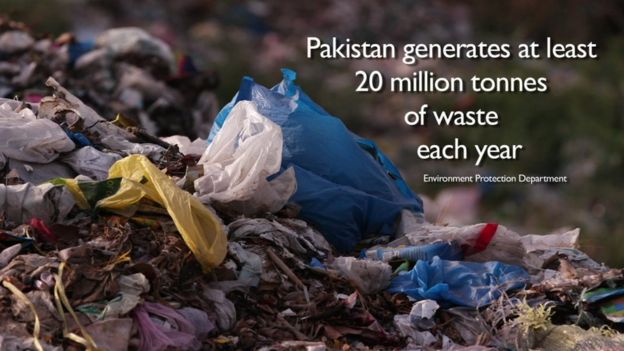
"I learnt to make the bags by watching YouTube.
"It is hard to balance my schoolwork with running Zeebags, so I make them at the weekend or during the holidays with my cousins.
"My father and grandfather pay for my raw materials and if they didn't help me, it would be very hard to keep my project going," she says.
One charity Zymal's money goes to is called SOS Children's Villages, which helps orphaned and destitute children across Pakistan.
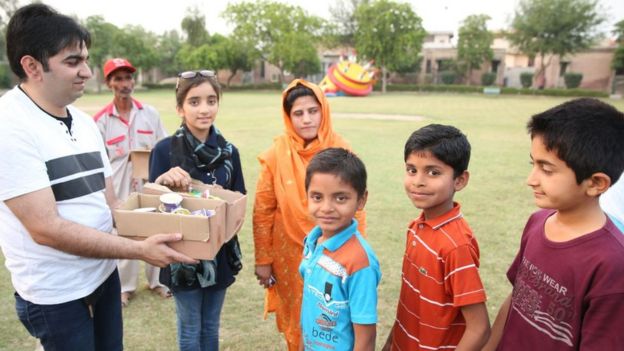
"Through my income I've been able to pay for water coolers, washing machines, batteries and the type of things they need for daily life," Zymal explains. "To see the happiness on their faces gives me a lot of satisfaction and motivation to carry on."
Her innovative and charitable enterprise has attracted a fair bit of attention with TV and newspaper coverage labelling Zymal as "Pakistan's youngest social entrepreneur".
Award winner
Zeebags has also won a number of awards in Pakistan, Saudi Arabia and the USA.
"I was very excited to get some international recognition for my work and proud to get some positive exposure for my country and parents."
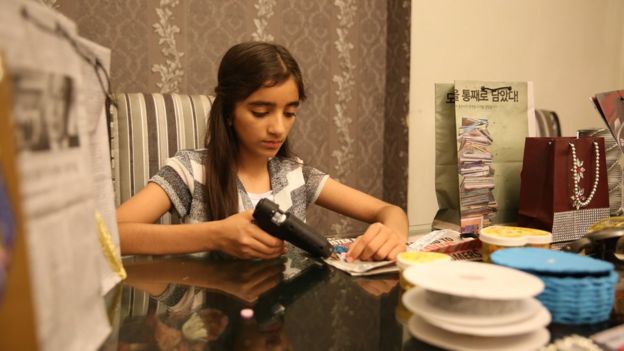
Selling online has opened up her business to a new world of possibilities.
"In Pakistan it's thought girls cannot work independently but I haven't faced any difficulties and my aim is to continue my work.
"I want to become a businesswoman in the future and expand Zeebags through my website and showcase other people's products, too."
The BBC's Innovators series reveals innovative solutions to major challenges across South Asia.
Ever heard of the concept of "jugaad"? It's a Hindi term meaning cheap innovation.
"My biggest ambition is to grow my project not just in Pakistan but also globally," she says.
Kalsoom Lakhani is founder of Invest2Innovate, an organisation that helps start-up companies in Pakistan grow and attract funding. She says the country needs to think about the future for entrepreneurs.
"While we have this enormous potential we need to be always thinking, how we enable that potential and how we continue to not only allow young people to start a business but allow them to grow businesses."
Pakistan has already begun to tackle its environmental problems through legislation, establishing government agencies and accepting technical help from international donors.
But the response is still fragmented and not a particularly high priority in a country racked with more pressing security and political issues.
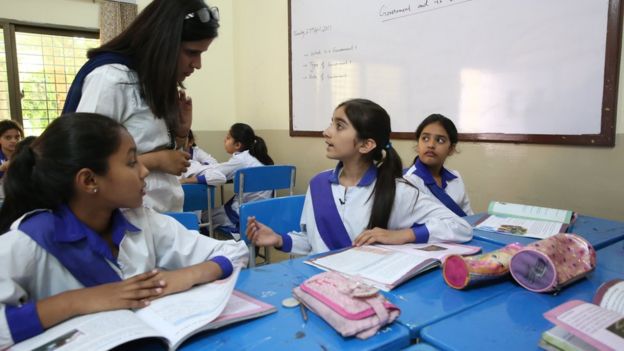
This gives Zymal's work even more urgency.
She hopes her success will start to change people's minds about the seriousness of taking care of their environment.
"It is important so future generations can live in a clean and safe world," she says.
"I want to be able to say I've played my part but it's up to others to do something themselves, too."
Source: BBCNews
|
